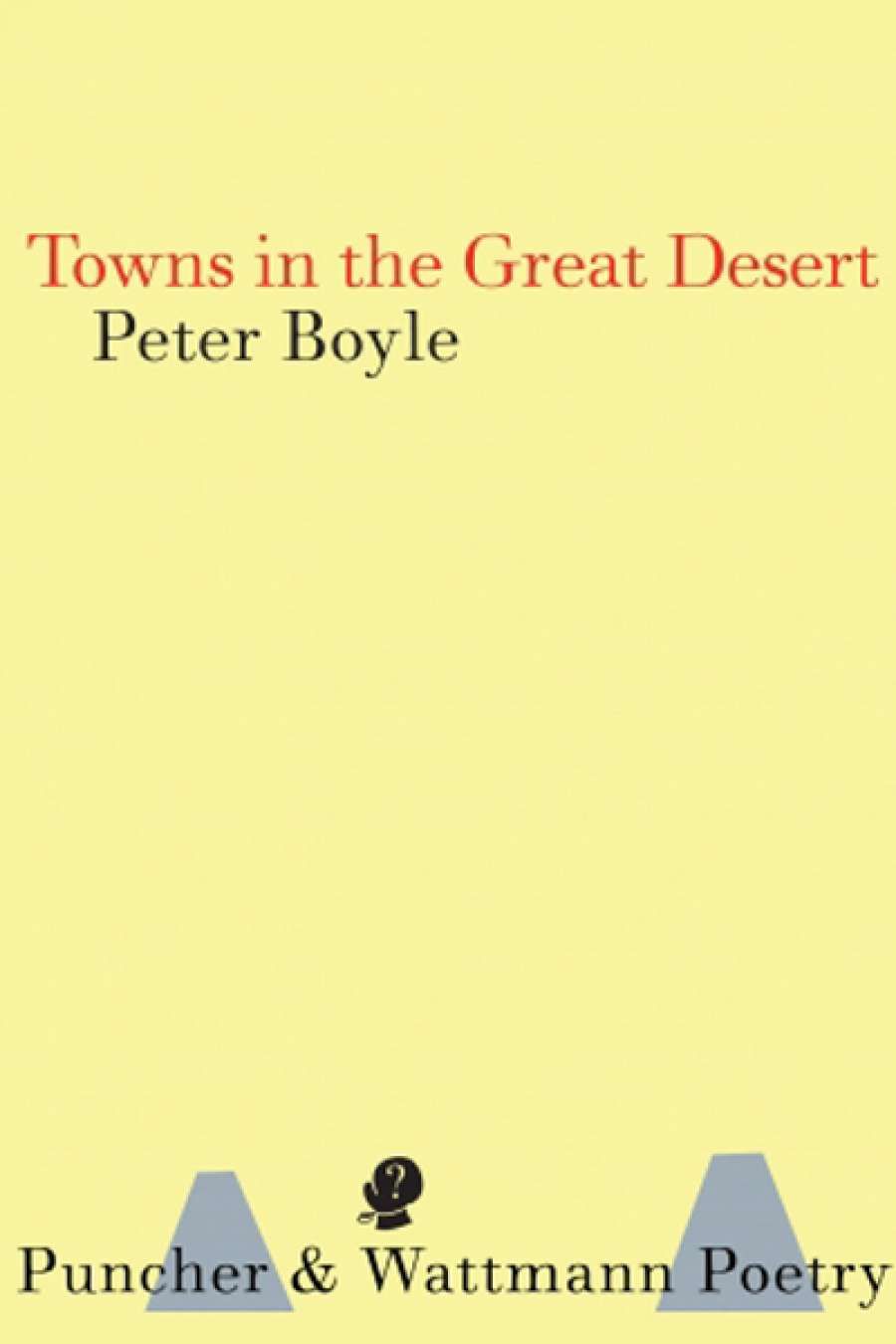
- Free Article: No
- Contents Category: Poetry
- Custom Article Title: Kevin Brophy reviews Peter Boyle's new collection of poetry
- Review Article: Yes
- Article Title: Millennial dust
- Online Only: No
- Custom Highlight Text:
Towns in the Great Desert, a New and Selected, may be the collection that defines Peter Boyle. Among Australian poets, Peter Boyle is an exotic, one who is likely to be read far into the future.
- Book 1 Title: Towns in the Great Desert
- Book 1 Biblio: Puncher & Wattmann, $29.95 pb, 237 pp, 9781922186393
In his 2010 Apocrypha, a book of imagined histories and fabricated documents, Boyle wrote of a possible language:
It is easy to believe there is another language always present at the edge of hearing, some slight, altogether bewildering shift in what we thought the finite reality called music, a colour no one has seen yet, familiar perhaps to some other people but hidden entirely from us, words with a nuance another tribe would grasp immediately but, to us forever incomprehensible, something that could have lifted the whole of our lives into another truth …
This passage encapsulates Boyle’s style, his poise, and his expressed and performed desire for language to come – deeply – into the world just as it comes to its own life as breath, thought, rhythm, and connection. This is both accessible and strange writing. It has the stretch of the storyteller and the detachment of the thinker worked into it.
The new poetry opens the book with a series of eleven poems under the title of ‘Towns in the Great Desert’. These eleven poems, strange and beautiful, seem at times to go to the heart of what it feels like to live with heat and sand at our doorstep, while retaining a mythical feel:
In the sky of this town there are no passing clouds or stars,
only the unbroken wall of millennial dust …
To buy water to drink
they send their children to slave in distant mines.
Of this town they say
‘The gods never came here’
(‘Towns in the Great Desert 2’)
There is a gritty lyricism and a laconic, catastrophic tone to these portraits of towns (‘In the canals, sharks cruise, / frenzied by toxic run-off’). There is an addictively neat facility with the thought or observation delivered as a couplet. Such as ‘Sleep has grown all around you / like a beautiful plant’ or ‘What mattered most in the dream / was the quality of blue in the water’.
Following this, a series of prose poems and short lyrics inhabits aspects of nature. They are testing, troubling, surreal in oxymoronic, paradoxical ways that recall John Ashbery, and they are beautifully detailed. Boyle takes up Blake’s river pebble, feels the surface warmth of the sun on it, imagines the history of ice ages within it, senses the ‘compact silence’ that ‘feels no need to set down roots’, and notes that against the sun’s cheerful projects, ‘[a] black fierce eye / withholds consent’ (‘Pebble’). Boyle’s pebble is not on a path to hell, nor does it twist the meaning of love, but rather it is an emblematic eye that will not blink or be beguiled by surfaces. Like Boyle’s own poetry, it holds a coolness in its depth.
Teasingly, Boyle refers to hospital visits, his reading of Cuban poetry while waiting for blood tests (‘one undivided silence sustains and engulfs me: / the summer sky, Cuba walking on across the page, my suspect blood’, from ‘Summer Day’). Mortality is there, at the edges, for him. Boyle prays to a day in October for ‘clarity as I vanish’, and it is this pure quality of perception and expression that all his poems seek, this pebble-nature.
Among ten nocturnes, Boyle is at home alone at night, imagining the city beneath him as he describes his situation: ‘Under a light-bulb I stand in the memory of light.’ The poetry itself is not as bleak as this pebble-resistance, for there is the exquisite recall of the way grilled croissants (who grills croissants?) might scent a whole house, and there are his imagined forebears, roughneck Irish tearaways brought to a halt on their horses by an explosion of wattle blossom in a Victorian winter mist.
The 140 pages of selected poems take the reader from 1988 to 2009, and the poetry is strongly imaginative, apocalyptic, and poised from the beginning. This is a poet acutely aware of the way Australia has been populated by waves of migration after wars and disasters on other continents. I could point to many poems and passages where these facts press in on the poetry without it flinching, but ‘Education’ is the poem that stands out as one that keeps not just the facts of brutality before us but makes its own human plea for understanding.
Boyle is a translator and poet immersed in history, music (Prokofiev, Mompou), poetry (Lorca, Vallejo, Borges), philosophy, and languages (Spanish, French), as much as nature (owls keep returning to his poems), politics, and urban life. He moves seemingly effortlessly from verse to prose poems, with ‘Everyday’ one of the outstanding moments. The final selection from Apocrypha makes for me a connection with Borges. This is the kind of book Borges might have imagined being written, and this is what makes Boyle such a startling figure in Australian poetry:
How do you live in a country that is travelling backwards? Each day it loses more of itself. Year by year its leaders strive to remove whatever elements of justice or compassion its people had slowly acquired. It prides itself on destruction and believes every reality can be renamed. So the great vanishing grows.


Comments powered by CComment